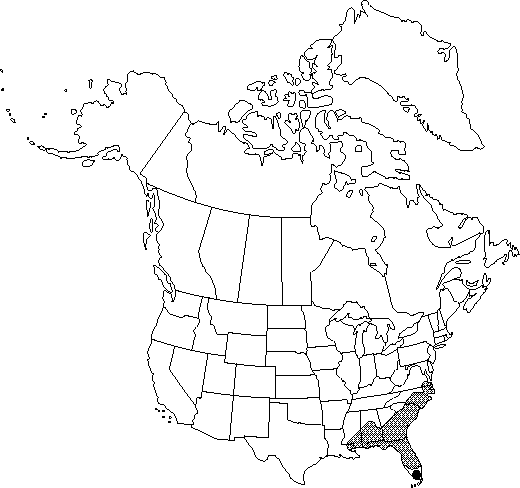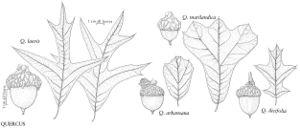Difference between revisions of "Quercus laevis"
Fl. Carol., 234. 1788.
FNA>Volume Importer |
imported>Volume Importer |
||
| (7 intermediate revisions by 2 users not shown) | |||
| Line 9: | Line 9: | ||
|common_names=Turkey oak | |common_names=Turkey oak | ||
|special_status={{Treatment/ID/Special_status | |special_status={{Treatment/ID/Special_status | ||
| + | |code=W1 | ||
| + | |label= | ||
| + | }}{{Treatment/ID/Special_status | ||
|code=E | |code=E | ||
|label=Endemic | |label=Endemic | ||
}}{{Treatment/ID/Special_status | }}{{Treatment/ID/Special_status | ||
|code=F | |code=F | ||
| − | |label= | + | |label=Illustrated |
| − | |||
| − | |||
| − | |||
}} | }} | ||
|basionyms= | |basionyms= | ||
|synonyms={{Treatment/ID/Synonym | |synonyms={{Treatment/ID/Synonym | ||
| − | |name= | + | |name=Quercus catesbaei |
|authority=Michaux | |authority=Michaux | ||
| + | |rank=species | ||
}} | }} | ||
|hierarchy=Fagaceae;Quercus;Quercus sect. Lobatae;Quercus laevis | |hierarchy=Fagaceae;Quercus;Quercus sect. Lobatae;Quercus laevis | ||
| Line 30: | Line 31: | ||
}}<!-- | }}<!-- | ||
| − | --><span class="statement" id="st- | + | --><span class="statement" id="st-undefined" data-properties=""><b>Trees </b>or shrubs, deciduous, to 20 m. <b>Bark</b> bluish gray, deeply furrowed, inner bark orangish or reddish. <b>Twigs</b> dark reddish brown with distinct grayish cast, (1.5-)2-3.5(-4) mm diam., sparsely pubescent to almost glabrous. <b>Terminal</b> buds light brown to reddish brown, conic or narrowly ovoid-ellipsoid, 5.5-12 mm, pubescent. <b>Leaves</b>: petiole 5-25 mm, glabrous. <b>Leaf</b> blade circular or broadly ovate-elliptic, widest near or proximal to middle, 100-200 × 80-150 mm, base attenuate to acute, occasionally obtuse or rounded, blade decurrent on petiole, margins with 3-7(-9) lobes and 7-20 awns, lobes attenuate to falcate, occasionally oblong or distally expanded, apex acute to acuminate; surfaces abaxially occasionally orange-scurfy, usually glabrous except for conspicuous axillary tufts of tomentum, adaxially glabrous, secondary veins raised on both surfaces. <b>Acorns</b> biennial; cup somewhat goblet-shaped, 9-14 mm high × 16-24 mm wide, covering 1/3 nut, outer surface puberulent, inner surface pubescent, scales occasionally tuberculate, tips loose, especially at margin of cup, acute, margin conspicuously involute; nut ovoid to broadly ellipsoid, 17-28 × 12-18 mm, often faintly striate, glabrate, scar diam. 6-10 mm.</span><!-- |
-->{{Treatment/Body | -->{{Treatment/Body | ||
| Line 37: | Line 38: | ||
|elevation=0-150 m | |elevation=0-150 m | ||
|distribution=Ala.;Fla.;Ga.;La.;Miss.;N.C.;S.C.;Va. | |distribution=Ala.;Fla.;Ga.;La.;Miss.;N.C.;S.C.;Va. | ||
| − | |discussion=<p>Quercus laevis reportedly hybridizes with Q. falcata (= Q. ×blufftonensis Trelease), Q. hemisphaerica, Q. incana, and Q. marilandica (C. S. Sargent 1918); with Q. nigra; and with Q. arkansana, Q. coccinea, Q. myrtifolia, Q. phellos, Q. shumardii, and Q. velutina (D. M. Hunt 1989).</p> | + | |discussion=<p><i>Quercus laevis</i> reportedly hybridizes with <i>Q. falcata</i> (= Q. ×blufftonensis Trelease), <i>Q. hemisphaerica</i>, <i>Q. incana</i>, and <i>Q. marilandica</i> (C. S. Sargent 1918); with <i>Q. nigra</i>; and with <i>Q. arkansana</i>, <i>Q. coccinea</i>, <i>Q. myrtifolia</i>, <i>Q. phellos</i>, <i>Q. shumardii</i>, and <i>Q. velutina</i> (D. M. Hunt 1989).</p> |
|tables= | |tables= | ||
|references= | |references= | ||
| Line 46: | Line 47: | ||
-->{{#Taxon: | -->{{#Taxon: | ||
name=Quercus laevis | name=Quercus laevis | ||
| − | |||
|authority=Walter | |authority=Walter | ||
|rank=species | |rank=species | ||
|parent rank=section | |parent rank=section | ||
| − | |synonyms= | + | |synonyms=Quercus catesbaei |
|basionyms= | |basionyms= | ||
|family=Fagaceae | |family=Fagaceae | ||
| Line 60: | Line 60: | ||
|publication title=Fl. Carol., | |publication title=Fl. Carol., | ||
|publication year=1788 | |publication year=1788 | ||
| − | |special status=Endemic; | + | |special status=W1;Endemic;Illustrated |
| − | |source xml=https:// | + | |source xml=https://bitbucket.org/aafc-mbb/fna-data-curation/src/2e0870ddd59836b60bcf96646a41e87ea5a5943a/coarse_grained_fna_xml/V3/V3_90.xml |
|genus=Quercus | |genus=Quercus | ||
|section=Quercus sect. Lobatae | |section=Quercus sect. Lobatae | ||
|species=Quercus laevis | |species=Quercus laevis | ||
| − | |||
| − | |||
| − | |||
| − | |||
| − | |||
| − | |||
| − | |||
| − | |||
| − | |||
| − | |||
| − | |||
| − | |||
| − | |||
| − | |||
| − | |||
| − | |||
| − | |||
| − | |||
| − | |||
| − | |||
| − | |||
| − | |||
| − | |||
| − | |||
| − | |||
| − | |||
| − | |||
| − | |||
| − | |||
| − | |||
| − | |||
| − | |||
| − | |||
| − | |||
| − | |||
| − | |||
| − | |||
| − | |||
| − | |||
| − | |||
| − | |||
| − | |||
| − | |||
| − | |||
| − | |||
| − | |||
| − | |||
| − | |||
| − | |||
}}<!-- | }}<!-- | ||
-->[[Category:Treatment]][[Category:Quercus sect. Lobatae]] | -->[[Category:Treatment]][[Category:Quercus sect. Lobatae]] | ||
Latest revision as of 21:52, 5 November 2020
Trees or shrubs, deciduous, to 20 m. Bark bluish gray, deeply furrowed, inner bark orangish or reddish. Twigs dark reddish brown with distinct grayish cast, (1.5-)2-3.5(-4) mm diam., sparsely pubescent to almost glabrous. Terminal buds light brown to reddish brown, conic or narrowly ovoid-ellipsoid, 5.5-12 mm, pubescent. Leaves: petiole 5-25 mm, glabrous. Leaf blade circular or broadly ovate-elliptic, widest near or proximal to middle, 100-200 × 80-150 mm, base attenuate to acute, occasionally obtuse or rounded, blade decurrent on petiole, margins with 3-7(-9) lobes and 7-20 awns, lobes attenuate to falcate, occasionally oblong or distally expanded, apex acute to acuminate; surfaces abaxially occasionally orange-scurfy, usually glabrous except for conspicuous axillary tufts of tomentum, adaxially glabrous, secondary veins raised on both surfaces. Acorns biennial; cup somewhat goblet-shaped, 9-14 mm high × 16-24 mm wide, covering 1/3 nut, outer surface puberulent, inner surface pubescent, scales occasionally tuberculate, tips loose, especially at margin of cup, acute, margin conspicuously involute; nut ovoid to broadly ellipsoid, 17-28 × 12-18 mm, often faintly striate, glabrate, scar diam. 6-10 mm.
Phenology: Flowering early to mid spring.
Habitat: Dry sandy soils of barrens, sandhills, and well-drained ridges
Elevation: 0-150 m
Distribution

Ala., Fla., Ga., La., Miss., N.C., S.C., Va.
Discussion
Quercus laevis reportedly hybridizes with Q. falcata (= Q. ×blufftonensis Trelease), Q. hemisphaerica, Q. incana, and Q. marilandica (C. S. Sargent 1918); with Q. nigra; and with Q. arkansana, Q. coccinea, Q. myrtifolia, Q. phellos, Q. shumardii, and Q. velutina (D. M. Hunt 1989).
Selected References
None.
